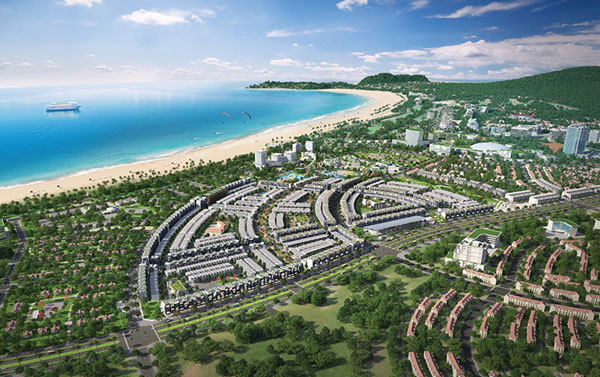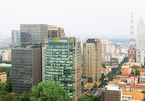 |
| Vietnam’s coastal areas boasts huge potential for the development of second homes, hotels, resorts, and other luxury properties. Photo: Le Toan/SGT |
According to Eric Solberg, chairman and CEO of independent investment firm EXS, these areas are interesting for both overseas investment funds and domestic developers.
“When we entered Vietnam 6-7 years ago real estate lending was tight and interest rates were very high. At that point, focusing on the major economic hubs made the most sense,” Solberg explained. “But as the major cities became much more expensive and competitive, I think it definitely makes sense for foreign investors and domestic developers to work together to explore other areas, especially Vietnam’s long, beautiful, and under-utilised coastline.”
Investors may be looking to combine their capital with the local expertise of Vietnamese developers to acquire prime sites in coastal urban areas as well as resort and recreational property generally.
“We are looking into such opportunities actively, around themes ranging from boutique luxury hotels to modern backpacker hostels. As always, we remain very positive about Vietnamese real estate,” Solberg added. “In any case, I would assume that the opportunities in Vietnam may be even more attractive than many other neighbouring countries.”
While Vietnam has made great progress over the past 10 years in becoming more attractive to foreign investors, Solberg would love to see the legal and approval process continue to develop in terms of clarity and protection for foreign groups.
Adam Bury, executive vice president of Investment Sales Asia at JLL Hotels & Hospitality Group, said that setting COVID-19 issues aside, Vietnam has remained hugely attractive for foreign investors for resort properties.
“In Southeast Asia, interest for Vietnam would only be surpassed by the number of investors looking to invest into Thailand, though interest in Vietnam would now generally outstrip that for Indonesia and Malaysia for example,” said Bury.
The perennial favourites for international investors have been Danang, Hoi An, Nha Trang, and Cam Ranh, given the greater maturity of the markets in those areas stemming from enhanced infrastructure to facilitate visitor arrivals, a larger range of tourist attractions, and greater diversity of real estate products, Bury added.
As domestic numbers have continued to increase, developers have looked to invest into upcoming areas including Binh Thuan and Binh Dinh, tapping into cheaper land values. These areas are typically characterised by development projects, as to the more established areas which may offering investment opportunities in cash flow producing assets, as well as land.
“Foreign investors have typically steered clear of land development projects in coastal areas, given the lead times to have projects up and running – where they have invested it has typically been in joint ventures with an experienced local player, or providing an exit option for the original developers at the completion of the project,” Bury explained.
“Combined with growing visitor arrivals opening up new destinations, we do expect a further drive to destinations such as Binh Thuan and for foreign investors’ appeal to increase.”
A new investment realm
Over the last 10 years, holiday property located along beaches was known as a luxury type of property game for wealthy people only, causing hesitation from buyers.
However more recently, buyers are changing their tastes. Property located in the coastal areas has not only become a demand for many buyers but also an interesting investment for intrigued parties.
This change follows a familiar move by other countries where living standards have increased and more and more buyers are now able to afford second homes or holiday properties alongside their regular accommodation.
Before 2020, Vietnam was welcoming an increasing number of international tourists over many years. Despite international routes still suffering from restrictions, domestic airlines are being resumed towards their initial volumes. According to experts, with good control of the pandemic reported during recent weeks, Vietnam has a unique opportunity to resume its tourist industry and to receive international tourists perhaps sooner than most other countries.
According to Tran Le Thanh Hien, general director of Danh Viet Group, there are three main reasons leading to the booming of coastal urban property in Vietnam over the last 10 years. “Firstly, the infrastructure system has been improved to create good foundation for developing property with a range of expressways, airports, and other routes,” Hien said. “Moreover, going along with the income increase, more and more people are now able to afford a private cab, this helps them to relax a little more.”
In addition to that, the tourism and property investment trend of the mid and higher income levels have been more positive, with more famous brand name of global hotel managers and operators flooding to the domestic market.
“Last but not least, the legal framework of holiday properties such as second homes, condotels, coastal villas, and townhouses have been gradually completed, and these have created favourable conditions for developers in their business,” Hien explained.
In the long term, holiday and coastal property in Vietnam expects to meet various demands of investors and end-users for relaxing, leasing, and also asset saving.
Domestic domination
Despite having great potential, coastal urban areas are now mostly dominated by local players.
Outstanding among those are NovaWorld Phan Thiet, developed by Novaland Group, and which is now under construction. This project spans over a vast 1,000 hectares and is now developing into a large-scale coastal urban area with more than 1,000 facilities. NovaWorld Phan Thiet will not only serve for accommodation but also offer many facilities for leisure and entertainment.
Novaland is also developing NovaWorld Ho Tram in the southern province of Ba Ria-Vung Tau, a complex of premier resort entertainment facilities also over 1,000ha.
Meanwhile Danh Khoi Group is developing Aria Danang Hotel and Resort. Located in the heart of the central city, Aria Danang Hotel and Resort is combining resort villas and condotels. Nguyen Quoc Bao, deputy general director of the roup, said that in addition his group will push the development of The Aston Luxury Residence this year, as well as some other projects in the central province of Binh Dinh.
Hung Thinh Group is meanwhile preparing to start a large-scale project located in Binh Dinh. This venture will be a complex of residences, villas, hotel, and resort.
Elsewhere, Nam Group has also recently started the Thanh Long Bay – an urban complex with sea sport and resort located in the central province of Binh Thuan. Its first part, named The Sound, is set to launch this month.
Also on the cards is Mui Ne Summerland Resort – a Las Vegas-inspired complex invested in by Hung Loc Phat. According to Nguyen Van Binh, deputy general director of Hung Loc Phat, the resort is to open at the end of 2022.
Coastal property has been no more limited in some golden destinations such as Vung Tau, Mui Ne, Nha Trang, Danang, Phu Quoc Island, and Halong but this trend is also expanding to many other destinations, which are deemed to be filled to the brim with potential for development.
|
Vietnam Investment Review hosts “Coastal Appeal” seminar Investment in coastal urban areas has grown into a new but powerful trend. Large-scale coastal urban projects and complexes with long-term ownership, a ready ecosystem, and business opportunities are driving the demand from buyers and investors alike. What will be the key products for buyers? Which developers are best able to develop large-scale projects? What does a good management team need to keep in mind to run complex of recreation and accommodation? What must be done when the term of ownership eventually expires? These will be the key questions to be answered at a seminar themed “Coastal Appeal” held by VIR this week. The seminar will feature leaders from the ministries of construction, and natural resources and the environment, as well as tourism management bodies, domestic and international experts, market research consultants, and developers directly investing in coastal urban areas. Time: From 8.30am on Wednesday, October 14, 2020 Venue: At Eastin Grand Saigon Hotel, 253 Nguyen Van Troi, Phu Nhuan district, Ho Chi Minh City. |
Bich Ngoc

Real estate developers risking it all in new segments
While flashy profit figures have made the real estate market an attractive target for many developers, the doors remain partly shut for newcomers.